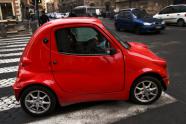Electric Cars Pull In
But will they go anywhere?

After lots of fanfare, electric cars have finally pulled into town. They power-up from a wall socket or charging station that will connect to the grid, enabling the potential to cut greenhouse gas emissions. But, for now, they depend on fossil-fired electricity - and whether utilities can meet the demands to be imposed upon them.
Advocates of the modern-style plug-in vehicles say that electric cars are more efficient than those that run on gasoline. That is, the emissions from traditional combustion engines exceed those that would be fueled by coal. If the utilities were to derive their power from other, alternative sources of power, the releases would fall accordingly.
But of course the central issue is whether the necessary infrastructure can be constructed that would allow the citizenry to change its transportation habits. To this end, the utilities are saying that investment in the smart grid that increases system efficiency and utilizes more green energy will go a long way.
"The electric utility industry will continue to work with federal and state policymakers and regulators to address issues such as the installation costs, the ownership of the charging infrastructure, and effective rate structures," says the Edison Electric Institute. "Plug-in vehicles should be able to handle the daily driving needs of most Americans using battery power, and will significantly decrease gasoline costs for their owners."
To get there, the Obama administration has targeted $400 million in grants to make the transformation from a gasoline-oriented transportation society to an electric one. It aims to get 20,000 charging stations in place by 2014.
Utilities, understandably, want in on the action. Stats show that this country alone spent $325 billion buying gas last year. All the electric car industry has to do is make a small dent in that market and the utilities will profit big time. It's estimated that 30,000 such cars will be on the roads this year.
Specifically, the Chevy Volt and the Nissan Leaf are in show rooms now. Other automakers such as Ford and Toyota are expected to come out with their own models. For now, the federal government is offering a $7,500 tax credit for those willing to buy these first generation plug-in vehicles. In states that have strict environmental standards such as California, the benefits grow even more. That helps bring down their price tag to more tangible levels at $30,000 plus.
"Plug-in electric vehicles are an alternative form of transportation that hold promise for reducing our dependence on petroleum-based fuel," says Pacific Gas and Electric. "Using vehicles like these in our daily activities can reduce the amount of gasoline we burn and help to significantly reduce tailpipe emissions."
Hard Sell
Here's the hitch: If consumers juice up from their homes during peak day-time periods, they could see their electric bills shoot way up. But if they do so at night when the demand for power is down, they will pay less than if they bought gasoline. Under this scenario, the cost of an equivalent electric-gallon of gasoline could be less than $1, says the Edison Electric Institute.
The distinction between peak and off-peak is important: Electric cars can use 20 percent more power than a single house, says the electric institute. So, if a whole neighborhood powers-up at the same time, it could drain utilities of their electric supplies.
The reality is that plug-in electric vehicles will not enter the market en masse. They are more likely to be novelties for the time being, allowing utilities to gradually upgrade their infrastructures to accommodate the potential demand.
The utility sector's frustration is that its attempts to enlarge the grid have become almost nightmarish. Such expansions are often opposed by civic groups that don't want to see power lines in their regions as well as by green groups who may argue that they are unnecessary or mere vehicles to generate more coal-fired power.
Whether plug-in electric cars turn out to be an environmental bonus depends on the math: They do emit less carbon dioxide than their counterparts in the conventional world. However, after the emissions at generating stations that supply their electrical power are figured in, they cannot sustain that advantage, says a report issued last December by the National Research Council.
Beyond 2030, the council says that plug-ins could account for significant reductions in U.S. carbon dioxide emissions. But it adds that will only happen if electricity generation plants fired by fossil fuels are equipped with carbon capture and storage systems or replaced with renewable energy or nuclear-powered plants. If coal continues to supply the preponderance of electric generation for decades to come, it says that the overall benefits to electric cars will be nominal.
"Relative to hybrid vehicles, plug-in hybrid electric vehicles will have little impact on U.S. oil consumption before 2030, especially if fuel economy for conventional vehicles and hybrids continues to increase past 2020," adds the National Research Council.
It therefore suggests a holistic approach to reducing dependence on foreign oil as well as cutting greenhouse gas levels. That entails increasing fuel efficiency standards, improving the hybrid technologies and developing hydrogen fuel cells.
Compromise is possible, which can facilitate the growth of this fledgling industry. Green groups and utilities generally concur that the transportation sector could perform better and reduce oil use. They also agree that the electric car is a viable alternative. Where they diverge, though, is how to build the nation's fuel portfolio.
Therefore, the immediate remedy is to invest in smart grid technologies that increase system efficiencies and make room for more alternative energy sources. Consumers may then drive away the winners.
EnergyBiz Insider has been named Honorable Mention for Best Online Column by Media Industry News, MIN.
So what do you think? Please share your thoughts by posting a quick comment below, or by sending a longer reply to energybizinsider@energycentral.com.
Follow Ken on www.twitter.com/freehand1200